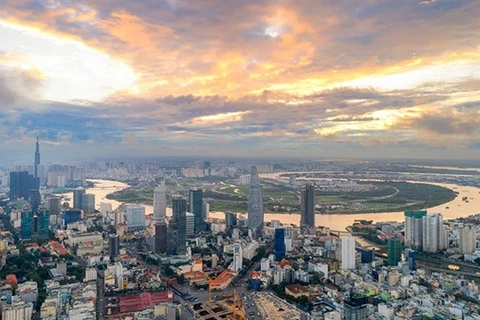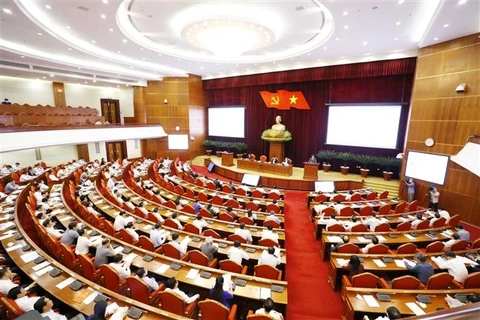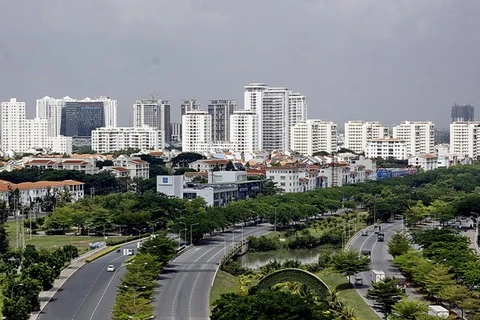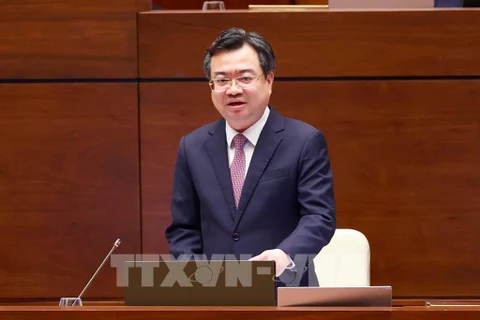Hanoi (VNA) – Prime Minister Pham Minh Chinh on November 30 co-chaired a national urban conference in Hanoi, which aims to disseminate and roll out the Government's Resolution 148/NQ-CP on implementing the Politburo's Resolution 06-NQ/TW on planning, construction, management and sustainable development of urban areas in Vietnam to 2030, with a vision to 2045.
In his opening speech, PM Chinh said the event is expected to create positive changes in the scale and quality of the urbanisation process and urban development in the next 10 years, focusing on improving the efficiency of resources exploitation and optimising urban innovative resources in addition to traditional resources, and the comparative and competitive advantages of urban areas, the PM said.
He urged ministries, sectors and localities to build and carry out specific and practical action programmes to immediately implement the planning, construction, management and development of urban areas in the country.
According to Chairman of the Party Central Committee's Economic Commission Tran Tuan Anh, before the conference, the commission and the Ministry of Construction hosted three symposiums on various issues related to urban development, collecting opinions from managers, experts, and scientists on how to effectively implement the relevant resolutions.
He suggested participants focus discussion on important issues such as tasks and solutions to create breakthroughs in sustainable urban development, planning management, building synchronous and modern urban technical infrastructure; and developing sustainable and synchronous urban network.
The Politburo issued Resolution No.06-NQ/TW on the planning, construction, management and development of sustainable urban development in Vietnam to 2030 with a vision to 2045 on January 24 this year. The Government issued Resolution No.148/NQ-CP to implement Resolution No.06 on November 11.
Under the Resolution No.148, Vietnam’s urbanisation rate would be at least 45% by 2025 and over 50% by 2030. In terms of economy, urban areas are projected to make up some 75% of the national GDP by 2025 and about 85% by 2030.
The proportion of the digital economy in the GRDP of centrally-run cities will reach 25% - 30% by 2025 and 35% - 40% by 2030.
Vietnam strive to build a network of internationally connected smart cities of national and regional levels, and 3-5 cities with regionally and internationally recognized brand names by 2030./.
In his opening speech, PM Chinh said the event is expected to create positive changes in the scale and quality of the urbanisation process and urban development in the next 10 years, focusing on improving the efficiency of resources exploitation and optimising urban innovative resources in addition to traditional resources, and the comparative and competitive advantages of urban areas, the PM said.
He urged ministries, sectors and localities to build and carry out specific and practical action programmes to immediately implement the planning, construction, management and development of urban areas in the country.
According to Chairman of the Party Central Committee's Economic Commission Tran Tuan Anh, before the conference, the commission and the Ministry of Construction hosted three symposiums on various issues related to urban development, collecting opinions from managers, experts, and scientists on how to effectively implement the relevant resolutions.
He suggested participants focus discussion on important issues such as tasks and solutions to create breakthroughs in sustainable urban development, planning management, building synchronous and modern urban technical infrastructure; and developing sustainable and synchronous urban network.
The Politburo issued Resolution No.06-NQ/TW on the planning, construction, management and development of sustainable urban development in Vietnam to 2030 with a vision to 2045 on January 24 this year. The Government issued Resolution No.148/NQ-CP to implement Resolution No.06 on November 11.
Under the Resolution No.148, Vietnam’s urbanisation rate would be at least 45% by 2025 and over 50% by 2030. In terms of economy, urban areas are projected to make up some 75% of the national GDP by 2025 and about 85% by 2030.
The proportion of the digital economy in the GRDP of centrally-run cities will reach 25% - 30% by 2025 and 35% - 40% by 2030.
Vietnam strive to build a network of internationally connected smart cities of national and regional levels, and 3-5 cities with regionally and internationally recognized brand names by 2030./.
VNA

























